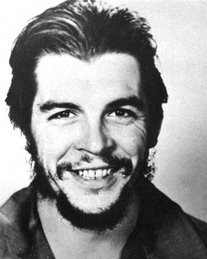A Tale of Two Countries
What Did Cuba Ever Do to Us?
by SAUL LANDAU and NELSON P. VALDES
“…they cannot forgive us that we are just so close to them, that we have made a Socialist revolution under the very nose of the United States!”
– Fidel Castro, April 16, 1961
“And forgive us our trespasses, as we forgive them that trespass against us.”
– English book of Common Prayer, 1662
After 53 years, we ask. Did the Cuban revolution accomplish its goals? Likewise, what happened to the US, which has relentlessly tried to block Cuba’s revolutionary path?
After the January 1959 revolutionary victory Washington’s elite understood that in Fidel Castro they might face serious rebelliousness to the accepted and enforced notion: Washington rules this hemisphere.
In 1954, Washington punished President Jacobo Arbenz for nationalizing United Fruit company property in Guatemala (a US-backed coup d’etat), to again dramatize how the US treated disobedience.
Despite the long history of US punishment of insubordinate Latin American leaders, Castro and compañeros remained focused on goals emerging in the 1860s’ revolt against Spain: independence; sovereignty; social justice.
When faced with Washington’s intransigent opposition Cuba’s leaders accepted the consequences of a kind of insurance policy written for their revolution in Moscow. They had no other protectors.
They knew that Latin American leaders who failed to toe the US line faced: assassination or military coups.
Unlike US influence, the Soviets would not own Cuban property. The US held the best land in Cuba, the biggest sugar mills, mines, telephone and utility companies, banks, politicians, casinos and much more. The Soviets never possessed an acre of Cuban land. They did, however, expect reciprocal ideological compliance.
From 1959 through the mid 1970s, Cubans became more literate and healthier. Their social services expanded along with a basically honest government. Cuba became an integrated nation state with a sense of purpose. But US policy directors understood: an external threat would compel revolutionaries to organize their defense.
They grasped Alexander Hamilton’s Federalist #8: “Safety from external danger is the most powerful director of national conduct. Even the ardent love of liberty will, after a time, give way to its dictates.”
In Cuba, Batista had not permitted free speech or politics; so no dramatic change took place. Unlike Batista, the revolutionaries had more than personal power to defend. And they understood the possible consequences.
US military forces killed up to 4 million Vietnamese (mostly civilians) and lost 58 thousand US troops as Cuba’s revolution developed. Few people today – or then – could explain the purpose of that war.
While engaged in Vietnam, Cambodia and Laos, the CIA also backed a string of military coups against democratically elected governments of Brazil (1964), Chile (1973) and interfering in political processes of other client states: invading the Dominican Republic and plotting in Argentina and Uruguay.
Cuban doctors and teachers went abroad to aid others, Cuban artists — painting and sculpture, poetry and literature, film, music and dance – made world-wide names for themselves. The CIA in Africa assassinated Congolese liberation leader Patrice Lumumba and backed merciless dictators. Cuban troops helped maintain Angolan independence despite serious threats from South African and CIA-backed troops invading from the south and east.
In 1994, at his inauguration as South Africa’s President Nelson Mandela acknowledged to Fidel Castro: “You made this possible.” He referred to the role of Cuban troops in 1987-88 in helping the Angolan army administer heavy losses to the South African forces who had invaded southern Angola, forcing the apartheid regime to change its strategy from military to political.
During the 1980s, Washington backed murderous regimes throughout the world, like those in El Salvador, Honduras and Guatemala; same old policy, but justified by Cold War rhetoric.
After the Soviets disappeared in 1991, the jubilation in Miami exile circles and Washington office parties ran at fever pitch: would the Cuban revolution collapse in a year – or less?
Now, 21 plus years later and still alive, Cuba’s revolution begins to change its economic and administrative orders. The US media routinely describes Cuba as poor, needy, miserable. But in 2012 on Cuba’s non-violent streets there aren’t vast numbers of homeless like those in US cities; and no hungry children (1 of 2 American kids experienced hunger last year).
In “free and democratic” Mexico and Central America thousands of gang-drug related murders occur annually. Cuba has no drug cartels or children frightened of a drive-by bullet. As US wars killed tens of thousands of Iraqi and Afghans and thousands of its own troops, Cuban doctors repaired the sightless vision of thousands of third world people around the world.
The US holds more political prisoners in Cuba — in Gitmo — than Cuba does, and now has laws allowing the President to assas … oops, execute US citizens he deems “terrorist” (without court procedures). US citizens can get jailed indefinitely with no recourse to Constitutional protections. But Washington blithely accuses Cuba of human rights violations.
Cuba does face a broken economy, a bloated bureaucracy and other serious problems – like no free press. Its leaders have begun a reform process, and a broad dialogue has emerged amongst the population.
In Washington denial prevails. Presidential aspirants on both sides ignore the trillions wasted on destructive wars, rotting infrastructure, spread of poverty, and drop in the standard of living.
Cuba policy remains inflexible. Hard liners demand ever more time for the policy to work! It’s only been 53 years since Washington’s elite decided to force regime change in Havana.
No one asks: What did Cuba do to us again?
Saul Landau, an Institute for Policy Studies fellow, produced Will the Real Terrorist Please Stand Up (Cinema Libre Studio). CounterPunch published his Bush and Botox World.
Nelson P. Valdés is Professor Emeritus, U. of New Mexico and director of the Cuba-L Project.
source : counterpunch.org
- INFOCUBA
+ Comité Internacional por la Libertad de los Cinco Cubanos
paul evrard

